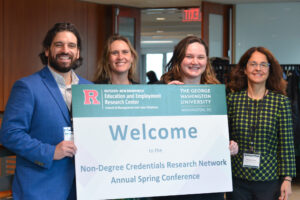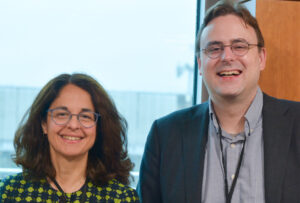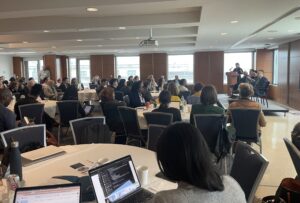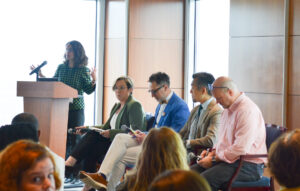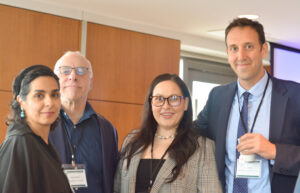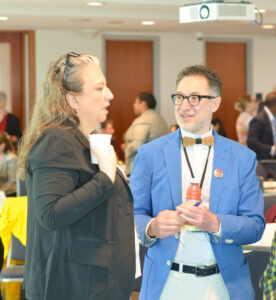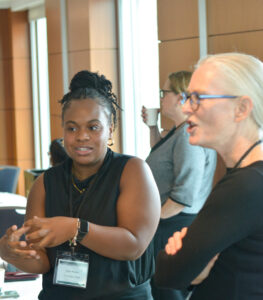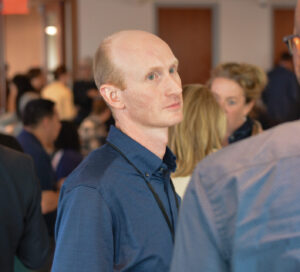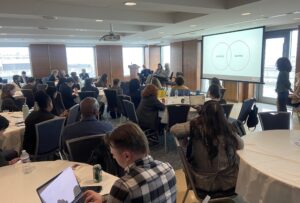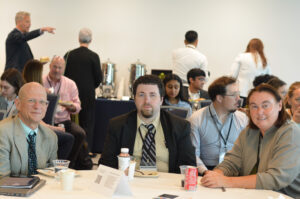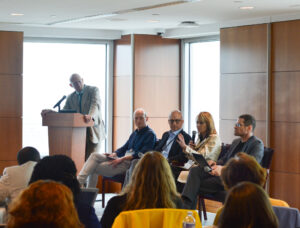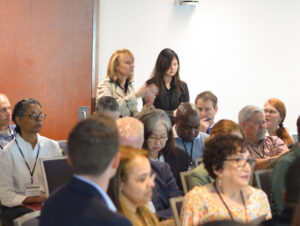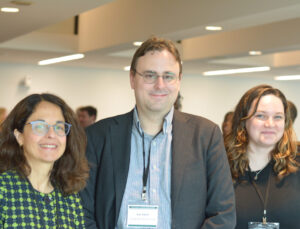Conferences
Coming Up! Our 8th annual conference will be held in May 2026.
Please check back for details in the coming weeks!
2025 Spring Conference
Thank you for attending NCRN’s 2025 Spring Conference on May 28th, at the George Washington University in Washington, D.C. It was an enriching day of leading experts discussing the evolving landscape of non-degree credentials (NDCs) with an audience of researchers, policymakers, and workforce experts.
Conference Session Details and Recordings
Introduction / Welcome and Strategic Plan Updates
Kyle Albert, George Washington University Institute of Public Policy
Michelle Van Noy, Rutgers University Education and Employment Research Center
Trends affecting non-degree credentials in the Trump era
Paul Fain, Work Shift

Moderator: Kyle Albert, George Washington University
The rise of a social movement around skills-based hiring was identified as one of the most significant developments affecting our field in the NCRN’s 2023 report Non-degree Credentials on the Move, but its implications for research and policy are still unclear as many organizations report that removing degree requirements has not necessarily resulted in the hiring and promotion of individuals without degrees. In this panel discussed the future of the skills-based hiring movement with a focus on how the research community can help us better understand its potential and limits. Among other questions, we asked what research and technological advances are needed to facilitate skills-based hiring, what changes in the political and social environment mean for the movement, and what role degrees and non-degree credentials should continue to play in a skills-centric labor market.
-
-
-
-
-
-
- Manny Lamarre, The Workforce Lab
- Amanda Welsh, Northeastern University
- John Colborn, Apprenticeship for America
- Corey Moss-Pech, Florida State University
-
-
-
-
-
Panel One Resources
- Bringing Richer, Verifiable Candidate Data Into HR Systems: An ecosystem roadmap
- The Evolution of Hiring: What managers know about, think about and are doing with microcredentials
- Brought, Sought, and Taught: Toward a System of Skill-Driven Applications
Moderator: Michelle Van Noy, Rutgers University
Like an amoeba, definitions of non-degree credentials continue to morph and evolve as the field shifts and credentials and providers proliferate. Over the years definitions and categories have been proposed and discussed, yet the field continues to use a multiplicity of terms to refer to non-degree credentials, microcredentials, alternative credentials, certificates, badges, certifications, licenses, apprenticeships, and more. To continue to advance this conversation, our panelists will discuss research and various national efforts that are creating movement in making sense of this potentially confusing foundational area of terminology.
-
-
-
-
-
-
- Scott Cheney, Credential Engine
- Noah Geisel, University of Colorado
- Melanie Gottlieb, American Association of Collegiate Registrars and Admissions Officers
- Hiro Okahana, American Council on Education
-
-
-
-
-
Panel 2 resources
Book Preview: Who Trains the Already Educated: Career-sustaining Training in Higher Education
John Skrentny, University of California-San Diego
Mary Walshok, University of California-San Diego
Book Preview Resources
 Moderator: Jeff Strohl, Georgetown University
Moderator: Jeff Strohl, Georgetown University
Over its six-year history, the NCRN has seen significant improvements in the coverage of non-degree credentials in both public and private data systems. Cumulative investments in workforce data infrastructure covering non-degree credentials such as statewide longitudinal data systems, federal workforce surveys (such as GEMEnA and NTEWS), and privately held data (e.g., National Student Clearinghouse and CredLens) now easily exceed 100 million dollars, and while U.S.-based researchers undoubtedly enjoy access to vast amounts of data, significant gaps in our understanding of non-degree credentials persist. These gaps seem to be especially significant for certain types of non-degree credentials, including non-credit certificate programs and industry certifications. This panel will explore what additional improvements in data infrastructure are necessary to advance our field – while also considering the possibility that the field should prioritize making better use of existing resources. The discussion includes an exploration of whether there is a need for a nationwide individual-level administrative dataset covering non-degree credential attainment and earnings, and if so, how we would go about building such a dataset.
-
-
-
-
-
-
- Mark D’Amico, University of North Carolina-Charlotte
- Naomi Boyer, Education Design Lab
- Adam Leonard, Natcast, formerly TX Workforce Commission
- Elliot Gillerman, CredLens
-
-
-
-
-
Panel 4: Research on Outcomes : What We’ve Learned Lately about the Labor Market Outcomes of NDCs
Moderator: Harry Holzer, Georgetown University
Whether non-degree credential deliver value and merit investment is a vital and urgently held question. Despite the limits to data in this realm, researchers are increasingly generating evidence needed to guide policy and practice on whether non-degree credentials deliver on the promises they are making to provide value to their holders. Our panelists shared the recent research from the field on costs, value, and learner perspectives.
-
-
-
-
-
- Mina Dadgar, Education Equity Solutions
- Jason Jabbari, Washington University
- Jinann Bitar, Education Trust
- Peter Bahr, Strada Education Foundation
-
-
-
-
Panel 4 resources:
- Conference Slides
- Does noncredit occupational training pay off for students?
- Making Every Rung of the Credential Ladder Count Understanding How Community College Certificates Can Meet Learner Expectations for Economic Mobility
- More Money for Less Time? Examining the Relative and Heterogenous Financial Returns to Non-Degree Credentials and Degree Programs
- Understanding the Full Cost of Short-Term Credentials
- Short-Term Credential Cost Data
International Reflections on NDC Data and Outcomes: Same Questions, Different Answers
Tom Weko, George Washington University
Mairéad Nic Giolla Mhichíl, Dublin City University
International Panel Resources
Mitchell Stevens, Stanford University
Futures Project Resources
-
Click below to access a compendium of transcripts from select sessions at our 2023 Spring Conference and the cumulative report associated with our 2021-23 grant cycle, Recent Developments and New Opportunities for Non-degree Credentialing Research.
-
Representatives of several research organizations met on December 2, 2022 to present updates on key research projects and policy initiatives underway. Slides from selected presentations are available via the links below:
- Organization for Economic Cooperation and Development
- Georgetown University Center for Education and the Workforce
- Jobs for the Future
- National Skills Coalition
- National Center for Science and Engineering Statistics
- Rutgers Education and Employment Research Center
- Workcred
- Society for Human Resource Management (SHRM) Foundation
- Harvard University Program on Workforce
In addition, Andrew Reamer moderated a discussion with Elisabeth Reynolds on credentials and U.S. industrial policy. Slides from Andrew’s presentation.
-
View the slides from the NCRN Spring Conference:
- Resubmission of AccelNet Proposal to National Science Foundation
- International Developments in Micocredentialing: Margo Griffith
- Data Issues Impacting Researchers and Users of Research: Kyle Albert
- Data Issues Impacting Researchers and Users of Research: Mark D’Amico
- Data Issues Impacting Researchers and Users of Research: Heather McKay
- Data Issues Impacting Researchers and Users of Research: Felicia Perez
- Data Issues Impacting Researchers and Users of Research: Andrew Reamer
- Labor-Market Outcomes of Non-degree Credentials: Matthew Baird
- Labor-Market Outcomes of Non-degree Credentials: Ashley Edwards
- Labor-Market Outcomes of Non-degree Credentials: Daniel Kuehn
- Public Policies Shaping the Non-degree Marketpace: Dana Kunzman, Nick Moore, Cynthia Proctor, Michelle Van Noy
- Credentials As You Go: Kirk Knestis, Nan Travers, Holly Zanville
- Higher Education as a Provider of Non-degree Credentials: Julian Alssid
- Higher Education as a Provider of Non-degree Credentials: Jim Fong
- Higher Education as a Provider of Non-degree Credentials: Christos Makridis
- Summary of NCRN Session on International Developments in Micro-Credentialing contributed by Michael Fung, Tecnologico de Monterrey
